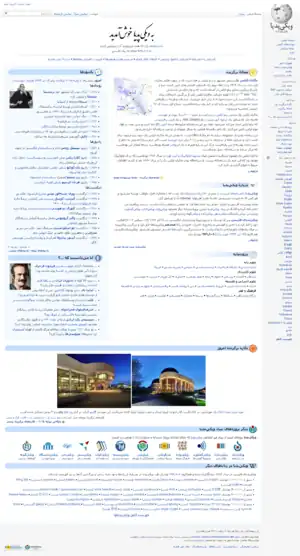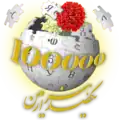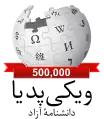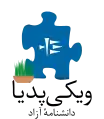 | |
Screenshot  Main Page of the Persian Wikipedia in June 2011 | |
Type of site | Internet encyclopedia |
|---|---|
| Available in | Persian |
| Owner | Wikimedia Foundation (non-profit) |
| URL | fa.wikipedia.org |
| Commercial | No |
| Registration | Optional (required only for certain tasks such as editing protected pages, creating pages or uploading files) |
| Users | 1,133,601 (total registered, as of 11 July 2022)[1] |
| Launched | December 19, 2003 |
Content license | Creative Commons Attribution/ Share-Alike 3.0 (most text also dual-licensed under GFDL) Media licensing varies |
Persian Wikipedia (Persian: ویکیپدیای فارسی, romanized: Wīkipediāī Fārsī) is the Persian language version of Wikipedia. The Persian version of Wikipedia was started in December 2003. As of January 2024, it has 988,844 articles, 1,280,453 registered users, and 88,442 files, and it is the 19th largest edition of Wikipedia by article count, and ranks 22nd in terms of depth among Wikipedias. It passed 1,000 articles on December 16, 2004, and 200,000 on July 10, 2012. Roozbeh Pournader is the project's first administrator, developer, and bureaucrat.
It is the most popular language version of Wikipedia in Iran and Afghanistan.
Number of articles
In January 2013, nearly 50,000 new articles were added within a month. A few days later, on 19 February 2013, the Persian Wikipedia reached 300,000 articles, ranking it 18th among all Wikipedias based on the number of articles.[2]
It currently has 988,844 articles, making it the 19th largest Wikipedia by article count.
History of the number of articles:
- 19 December 2003: started
- 18 February 2006: reached 10,000 articles
- 30 October 2008: reached 50,000 articles
- 25 August 2010: reached 100,000 articles
- 9 July 2012: reached 200,000 articles
- 19 February 2013: reached 300,000 articles
- 18 July 2014: reached 400,000 articles
- 27 July 2016: reached 500,000 articles
- 3 May 2018: reached 600,000 articles[3]
- 8 November 2019: reached 700,000 articles
- 26 May 2021: reached 800,000 articles
- 13 April 2022: reached 900,000 articles
Article depth
With article depth of 151, the Persian Wikipedia is currently ranked 23rd among all Wikipedias based on article depth.[4]
Issues
Freedom of expression in the Persian-speaking countries of Iran, Tajikistan, and Afghanistan is low.[5][6][7][8][9]
Copyright
Knowledge about copyright rules is poor in Iran that hinders users.
Cost of bandwidth
Tariffs for National Information Network is 75% cheaper than internet price.[10]
Citation
Iran ranks last in Freedom House freedom of the press ranking, there is a challenge for finding Persian citations.[11]
Ministry of Islamic Culture and Guidance
According to reports by human rights lawyer Shadi Sadr, RFERL, Iranwire, Iran International, Justice for Iran, Open Democracy, Radio Zamaneh and other news outlets, the Ministry of Islamic Culture and Guidance and the Iranian Cyber Army may be interfering the Persian Wikipedia, although the Wikimedia Foundation denies that there is abuse taking place.[12][13][14][15][16][17][18] In 2019, German news outlet Deutsche Welle reported that WMF had launched an investigation.[19]
Censorship
In a November 2013 report published by the Center for Global Communication Studies of the University of Pennsylvania, researchers Collin Anderson and Nima Nazeri scanned 800,000 Persian language Wikipedia articles and found that the Iranian government blocks 963 of these pages. According to the authors, "Censors repeatedly targeted Wikipedia pages about government rivals, minority religious beliefs, and criticisms of the state, officials, and the police. Just under half of the blocked Wiki-pages are biographies, including pages about individuals the authorities have allegedly detained or killed."[20] Anderson said that Persian Wikipedia, as a microcosm of the Iranian internet, is a "useful place to uncover the types of online content forbidden and an excellent template to identify keyword blocking themes and filtering rules that apply across the greater internet."[21]
On 2 March 2020, during the COVID-19 pandemic in Iran, the Persian Wikipedia appeared to be disrupted in Iran after the death of Mohammad Mirmohammadi, who was a close confidant to the country's supreme leader, Ali Khamenei.[22]
Gallery
 100,000 entries celebration logo (August 2010)
100,000 entries celebration logo (August 2010).svg.png.webp) Persian Wikipedia's Nowruz logo (21 March 2015)
Persian Wikipedia's Nowruz logo (21 March 2015).svg.png.webp) Persian Wikipedia's Nowruz logo (21 March 2016)
Persian Wikipedia's Nowruz logo (21 March 2016) Persian Wikipedia's 500,000 article logo (27 July 2016)
Persian Wikipedia's 500,000 article logo (27 July 2016).svg.png.webp) Persian Wikipedia's Nowruz logo (21 March 2017)
Persian Wikipedia's Nowruz logo (21 March 2017) 600,000 entries celebration logo (March 2018)
600,000 entries celebration logo (March 2018) Persian Wikipedia's Nowruz logo (21 March 2019)
Persian Wikipedia's Nowruz logo (21 March 2019) 800,000 entries celebration logo (May 2021)
800,000 entries celebration logo (May 2021) 900,000 entries celebration logo (April 2022)
900,000 entries celebration logo (April 2022)
See also
References
- ↑ List of Wikipedias Archived 2022-07-11 at the Wayback Machine. Wikimedia.org. 13 January 2014. Retrieved 13 January 2014.
- ↑ List of Wikipedias Archived 2017-08-30 at the Wayback Machine. Wikimedia.org. 19 February 2013. Retrieved 19 February 2013.
- ↑ List of Wikipedias/Table Archived 2021-06-15 at the Wayback Machine meta.wikimedia.org, Statistics at 12:00, 18 July 2014 (UTC)
- ↑ "Wikipedia article depth - Meta". meta.wikimedia.org. Archived from the original on 9 November 2020. Retrieved 12 July 2022.
- ↑ Mehrdad, Ezzatullah (11 September 2020). "In Afghanistan, Social Media Is the Only Way to Talk Back to the Taliban". Foreign Policy. Retrieved 2021-06-15.
- ↑ "Freedom of Speech in Tajikistan: Don't Seek, Don't Ask, Don't Talk". CABAR.asia. 2019-12-20. Retrieved 2021-06-15.
- ↑ Welle (www.dw.com), Deutsche. "Press freedom in Tajikistan: Going from bad to worse | DW | 05.06.2020". DW.COM. Retrieved 2021-06-15.
- ↑ Refugees, United Nations High Commissioner for. "Refworld | Tajikistan: Freedom of Expression Still Threatened". Refworld. Retrieved 2021-06-15.
- ↑ "Concern About Freedom of Expression In Tajikistan | USOSCE". U.S. Mission to the OSCE. 2018-04-12. Retrieved 2021-06-15.
- ↑ "کاهش تعرفه ترافیک داخلی در سایت های منتخب". همراه اول - اولین ارائه دهنده نسل چهار و نیم اینترنت همراه در ایران (4.5G/4G/3G) (in Persian). Archived from the original on 2021-06-06. Retrieved 2021-06-15.
- ↑ "Why ordinary Iranians are turning to internet backdoors to beat censorship". BBC News. 2018-01-10. Archived from the original on 2019-11-02. Retrieved 2021-06-15.
- ↑ "Persian Wikipedia: an independent source or a tool of the Iranian state?". openDemocracy. Archived from the original on 2021-04-06. Retrieved 2021-06-15.
- ↑ Mehdi (2019-10-21). "چرا پاسخ بنیاد ویکیمدیا مبنی بر عدم دخالت جمهوری اسلامی در ویکیپدیای فارسی نادرست است؟". Justice for Iran (in Persian). Archived from the original on 2021-01-28. Retrieved 2021-06-15.
- ↑ فردا, رادیو (2021-06-15). "انتقاد سازمان عدالت برای ایران از «سانسور و مداخله جانبدارانه» در ویکیپدیای فارسی". رادیو فردا. Archived from the original on 2021-06-15. Retrieved 2021-06-15.
- ↑ "شادی صدر: از ویکیپدیا میخواهیم مثل فیسبوک و توییتر با ارتش سایبری جمهوری اسلامی برخورد کند – Justice for Iran". 2021-06-15. Archived from the original on 2021-06-15. Retrieved 2021-06-15.
- ↑ "شادی صدر: از ویکیپدیا میخواهیم مثل فیسبوک و توییتر با ارتش سایبری جمهوری اسلامی برخورد کند". IranWire | خانه (in Persian). Archived from the original on 2021-06-15. Retrieved 2021-06-15.
- ↑ "ویکیپدیای فارسی: منبعی مستقل یا ابزاری در دست دولت ایران؟". www.radiozamaneh.com (in Persian). 19 September 2019. Archived from the original on 2021-05-01. Retrieved 2021-06-15.
- ↑ "Critics Say Some Persian Wikipedia Content Manipulated By Iran's Government". RFE/RL. 11 October 2019. Archived from the original on 2021-01-27. Retrieved 2021-06-15.
- ↑ Welle (www.dw.com), Deutsche. ""تحقیقات بنیاد ویکیمدیا درباره ویکیپدیای فارسی آغاز شده است" | DW | 10.10.2019". DW.COM (in Persian). Archived from the original on 2021-06-15. Retrieved 2021-06-15.
- ↑ Anderson, Colin; Nazeri, Nima (7 November 2013). "Citation Filtered: Iran's Censorship of Wikipedia" (PDF). Center for Global Communication Studies (University of Pennsylvania). Archived from the original (PDF) on 26 November 2018.
- ↑ "How Iran Uses Wikipedia To Censor The Internet". BuzzFeed. 12 November 2013. Archived from the original on 25 December 2018. Retrieved 8 September 2017.
- ↑ "Iranian Wikipedia disrupted amid coronavirus outbreak: Rights group". Al Arabiya English. 3 March 2020. Archived from the original on 6 August 2020. Retrieved 6 March 2020.
External links
- Persian Wikipedia mobile version (in Persian)
